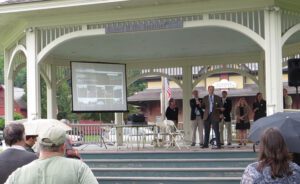
Paul Costello, Executive Director of the Vermont Council on Rural Development, Speaks at Royalton’s Downtown Wi-Fi Launch. Also Onstage (left to right): Tricia Coates (Congressman Welch’s Office), Ted Brady (Senator Leahy’s Office), Ryan Egger (Senator Leahy’s Office), Sarah Buxton (local State Representative), Joan Goldstein (Executive Director of the Green Mountain Economic Development Corporation), and Larry Trottier (Royalton Selectboard Chair).
June 14, 2013 (Montpelier, Vermont.) — On a rainy Thursday afternoon, vendors gathered on the South Royalton green for the third annual BALE (Building a Local Economy) festival, but this year there was an added benefit to the town: a new free Wi-Fi zone blanketed the green and allowed vendors and visitors alike to access the Internet during the festival.
This new free Internet is made possible by the Vermont Digital Economy Project, which is offering many services to the town of Royalton and other flood-impacted communities, including the downtown Wi-Fi zone, help building out the town’s municipal website, local “internet interns” to help internet beginners, and workshops and advising for businesses and nonprofits.
The launch of the Wi-Fi zone coincided with the beginning of BALE fest, and included speeches from Paul Costello, the Executive Director of the Vermont Council on Rural Development, the parent organization of the Vermont Digital Economy Project, as well as Ted Brady, from Senator Leahy’s Office, Tricia Coates, from Congressman Welch’s Office, Sarah Buxton, the area’s State Representative, Larry Trottier, the Royalton Selectboard Chair, and Joan Goldstein, Executive Director of the Green Mountain Economic Development Corporation and Royalton Selectboard member.
All speakers agreed on one thing: the new Wi-Fi zone demonstrates the capability of Vermonters to rally together to create positive changes in their own communities. They also expressed their understanding that the new Wi-Fi zone would help to promote economic development by signifying the willingness of Vermonters to look forward and implement new technologies as they become available.
“It’s a win, win, win, win” said Sarah Buxton, “a win for the local businesses, a win for residents of Royalton, a helpful tool for visitors, and a way to promote safety awareness.”
“This will help us stand up to the next Irene,” said Ted Brady.
This Wi-Fi launch is just the beginning of the work that the Vermont Digital Economy Project is doing throughout the state. Fourteen more Wi-Fi zones will be implemented, including one in Bethel, which is scheduled to launch next Thursday, June 20, at 5pm.
“The Vermont Digital Economy Project team and our many partners are currently active in a dozen flood-impacted communities,” said Sharon Combes-Farr, Project Director. “In addition to Caitlin’s work on downtown Wi-Fi zones, our team is directly advising nonprofits on the use of digital tools to improve resilience and strengthen organizations, while our project partners are working with communities to strengthen local government communication, advice small businesses, and deploy interns at local libraries to improve digital skills within these communities.”
The team’s work in strengthening area businesses and nonprofits has already started to have an effect. Rob Fish, the Vermont Digital Economy Project’s Nonprofit Advisor and Community Organizer, has been in contact with over fifty nonprofits throughout the state, and is currently working on projects with thirty of these organizations.
“The needs of these nonprofits are extremely varied in scope,” said Fish, “with some, it was as simple as walking through their current website and explaining how to use what they have to reach a larger audience.” Others involved more time-intensive tasks, such as helping to create a new website for the Deerfield Valley Rescue Organization, who had not been able to update their old site for four years. “There is nothing more satisfying than helping small community organizations better serve their community,” said Fish, “I know every new tool I provide or skill I teach is going to benefit the community as a whole.”
The Internet Interns that have been placed in libraries across the state have also been touching the lives of many within Vermont communities. One internet intern helped a client to find and download English language learning videos. “[The client] was extremely grateful for the time I spent with him. I hope to be able to help and encourage him to learn the language better,” said the intern.
As the project continues, it will have an even greater impact on individuals and communities, from those who are already technologically capable, who can now use Wi-Fi on their town greens to those who can learn new digital skills with the help of a patient supporter.
About the Vermont Digital Economy Project
The Vermont Digital Economy Project was created to address vulnerabilities of Vermont business and communities that are not fully utilizing online tools. The project offers free support to speed flood recovery, spur economic development and job growth, and improve community resilience to disasters. The project is working directly with at least 25 of the towns that were affected by flooding to help businesses, nonprofits, and municipalities expand their innovative use of online tools. It is funded by a disaster recovery grant from the Economic Development Administration and from the donations and expertise of its partners (IBM, Microsoft, the Snelling Center for Government, the Vermont Department of Libraries, the Vermont Small Business Development Center, and the Vermont State Colleges) to provide grant services. More information can be found online at: http://vtdigitaleconomy.org/.
About the Vermont Council on Rural Development
The Vermont Council on Rural Development (VCRD) is a non-profit organization dedicated to the support of the locally-defined progress of Vermont’s rural communities. A dynamic partnership of federal, state, local, non-profit and private partners, it is actively non-partisan with an established reputation for community-based facilitation. Through collaboration with government entities, businesses, and other groups, VCRD helps Vermonters and Vermont communities develop their capacity to create a prosperous and sustainable future through coordination, collaboration, and the effective use of public and private resources. To find out more, visit www.vtrural.org.
